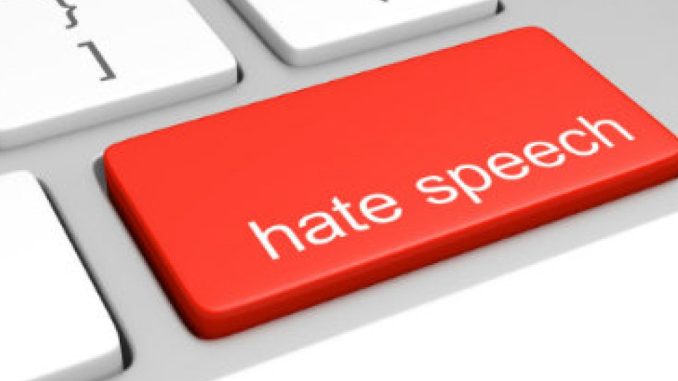
“You still playing Genshin Impact?”
The statement sounds harmless, or even just out of curious concern. However, these words often alerted the players of Genshin Impact immediately. Because such discussions, in the experience of these players, often lead them to a situation where they are mocked, attacked, or even abused. Soon enough, they will be described as “miHoYo Fan Army” (the production company of the Genshin Impact games is miHoYo) “miHoYo bootlicker” “brainless players”, which is a personal attack case.
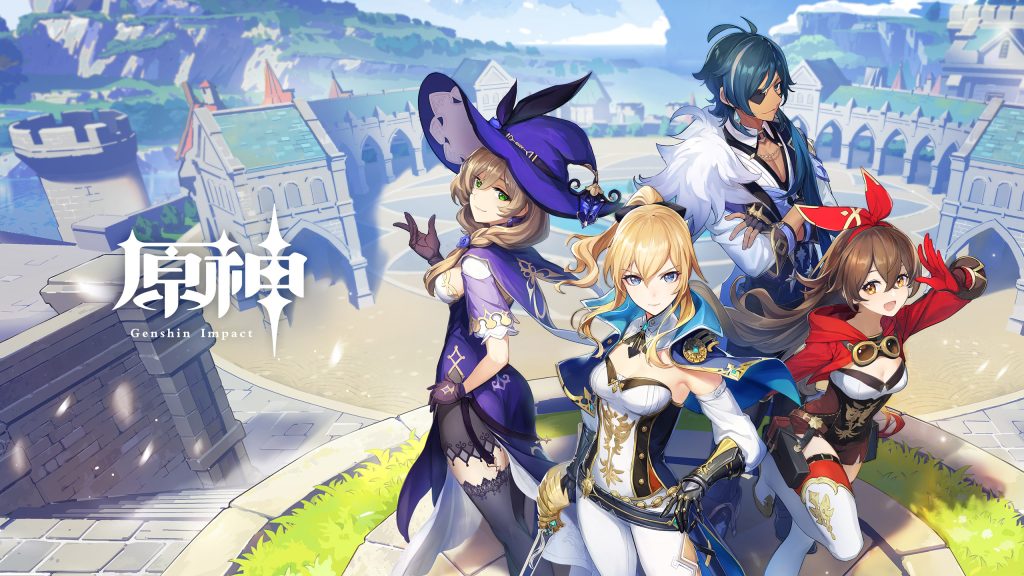
Since the release of Genshin Impact in 2020, it has served as a phenomenal game for all of China, and the world’s gaming market. However, it, and its players, have received more criticism and scorn on the Chinese internet than all the accolades it has received. Even it has received TGA Mobile Game of the year, Golden Joystick Awards, and many positive comments according to game industry, this game still be known as a “problem” game, and the players as “problem” players.
This blog will deconstruct this Chinese Internet phenomenon through hate speech, online harm, and related theories. It focus on harms faced by Genshin and their players, including identity labeling, the dissemination of platform mechanisms, and cultural bias. And it will explain why Genshin has become a symbol of hate speech on the Chinese Internet, and how players, as a community of interest, have been caught up in such a hostile online environment.
- 1. Definition of hate speech and online harm
To deconstruct the phenomenon, this paragraph will clarify related theories and concepts.
First, hate speech can be explained by Parekh(2012, p. 40), speech that “expresses, encourages, stirs up, or incites hatred against a group of individuals distinguished by a particular feature or set of features such as race, ethnicity, gender, religion, nationalist, or sexual orientation”. It can be understood as negative or hateful comments towards a specific group of people with specific characteristics, which could include the player group of Genshin. While online harm is the various aspects of possible harm or influence that these populations suffer in the face of corresponding hate speech.
Meanwhile, in Facebook: Regulating Hate Speech in the Asia Pacific (Sinpeng et al., 2021, p. 11), it mentioned that hate speech and online harm tend to contain both constitutive harm and systemic discrimination. The former is interpreted as “harm directly caused by words”, which corresponds to causal harm, where constitutive harm refers to the labeling or demeaning/discriminatory aspects of the discourse itself. Systemic discrimination, on the other hand, is “a state of ‘who can be degraded’ that is not an individual bias or one-off discriminatory act, but is maintained by a set of social structures, linguistic environments, and platform mechanisms”.
- 2. Problems Genshin and its players facing
Genshin Impact is an open-world multiplatform game developed by Shanghai miHoYo Company. The main gameplay is an anime-inspired aesthetics, plot update experience, open-world exploration, and gacha-based fighting. This makes it the first cross-platform ACGN game, and also makes it gained the console/PC game players as well as the mobile game common attention from the launch. The quality of the game’s graphics and characterization is superior in 2020 and even now, which has made the game a phenomenal hit. At the same time, Genshin also brought unprecedented controversy: many people thought that the design of the first country in game had the suspicion of copying The Legend of Zelda: Breath of the Wild. While due to its rapid capture of a large markets, the public began to irrationally criticize all of its game content, and described that there were many problems with Genshin Impact, while the players who played it were “condoning such a game to pollute the market”.
It is impossible to say where and when this kind of comments comes from. This makes it one of the most absurd facts of the entire hate speech phenomenon: players and game are in fact being criticized and attacked for “no specific reason”. These voices have been heard throughout the five years of development of Genshin and the five years of player experience. Many parts of the game have been taken out of context and put under a microscope. And there have been many controversies over characterization and portrayals that have been deemed sexist. As a result, even though Genshin has continued to improve its content and enrich its gameplay, the game has been mocked as “trash” or “a failure”.
In this process, the most affected are the players. Many Genshin players from different periods of time have said that after expressing that they like Genshin or that they are playing Genshin, they would be attacked for “awful game player” or called “Genshin trash” “brain-damaged Genshin fans”. They are constantly labeled, vilified, and physically attacked by the community or group. It seems that playing Genshin is an “evil” thing to do, and once they have played it, even if they have done other good things, they will be criticized and abused. Many creators of videos and game guide have been doxxing on social media platforms, i.e., their personal information, home addresses, and contact information have been publicly disclosed, and this has had a significant impact on creators’ personal lives. Some creators have even been bombarded with messages, mailed threatening letters, and terrorized with toys by these attackers. Even after five years, such incidents are still common, and many platforms even have “Haters of the Genshin Group” where users express their prejudices and attacks against Genshin players in a twisted manner.
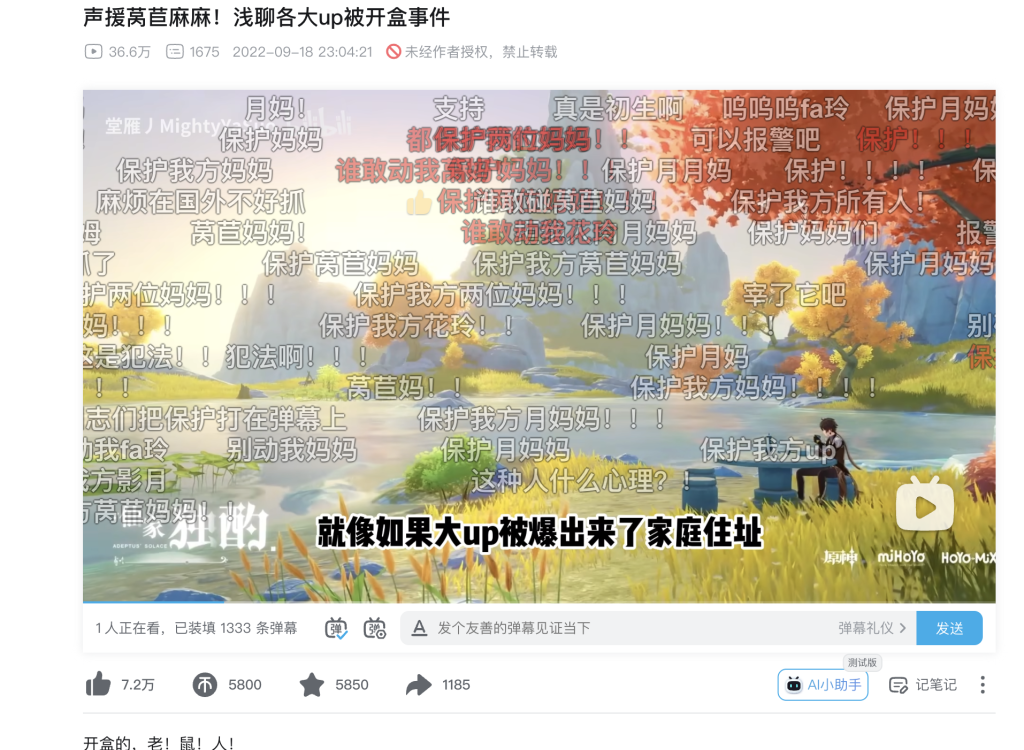
Screenshot from a bilibili video titled
“声援莴苣麻麻!浅聊各大up被开盒事件”(Supporting Content Creators Against Doxxing). The screen is flooded with live comments from Genshin players expressing outrage at the exposure of creators’ personal information. Common phrases include“Protect our creator!” and “Don’t hurt game guide!” referencing affectionate nicknames for creators.
Note. Screenshot taken from Bilibili, uploaded by user @堂雁丿MightyYaSuo, https://www.bilibili.com/video/BV1wG411o7rS
It is a stigmatization and identity discrimination based on group identity, bringing mental harm and fear of self-expression to gamers. Because as long as they are identified as Genshin players, then they criticize other games is irrational, and praising the love of Genshin is “brainless brainwashed fans”. At some point, mocking Genshin became the safe opinion — the thing you say to prove you’re not one of them. Also, the creators’ for Genshin has to face the harm of being criticized, public pressure, and having their personal information disclosed, even if it’s illegal.
- 3. Acquiescence to hate speech by social platform mechanisms
There are also platform mechanisms that contribute to online hate speech with such a wide range of impacts. Many of the platforms’ stream-pushing or in-feed mechanisms and video-post rewards had led to the amplification of these conflicts. With the fact that Genshin itself has a huge group of players, according to official data projections, the number of daily active players in Genshin is in the tens of millions. This makes it easy for game-related comments to be noticed by the public and extend to more platforms and more people who unknowingly follow the comments.
Taking bilibili’s in-feed as an example, content with high interaction rate, large number of comments and likes will be more likely to be put on the homepage and recommendation page to spread to more users. Topic such as “insulting Genshin” will often lead to quarrels between detractor and players in the bullet comments and comment section, leading to a bunch of interaction of the video. But the platform’s own feeding mechanism often fails to recognize the content as offensive (Carlson & Frazer, 2021, pp. 17-18), such videos are pushed to more users. The critical content of the video, with the bickering in the comments section, can lead uninformed viewers to be skeptical of the quality of Genshin, and to the impression that “Genshin players are aggressive”. Such prejudices and stereotypes are then reinforced by the platform’s mechanisms, resulting in wider discrimination and influence.
At the same time, reporting fatigue is what keeps such hate speech at bay. Reporting fatigue is a phenomenon that can be summarized as: When they then asked for further clarification, they received only automated messages. These negative experiences of reporting hate speech have dissuaded them from further engagement (Sinpeng et al., 2021, p. 38). Like the massive amount of hate speech faced by Genshin and its players, the platforms are often unable to respond and remove it quickly enough, while releasing new videos is far more quickly. These cause a vicious cycle where players report it to inefficient and the attackers continue to grow.
This has also led to a paradoxical phenomenon. Since “insulting Genshin” often gets higher views and better rewards from bilibili, many creators who love Genshin have tried to change their video titles and covers to “criticizing/abusing Genshin and its players”.
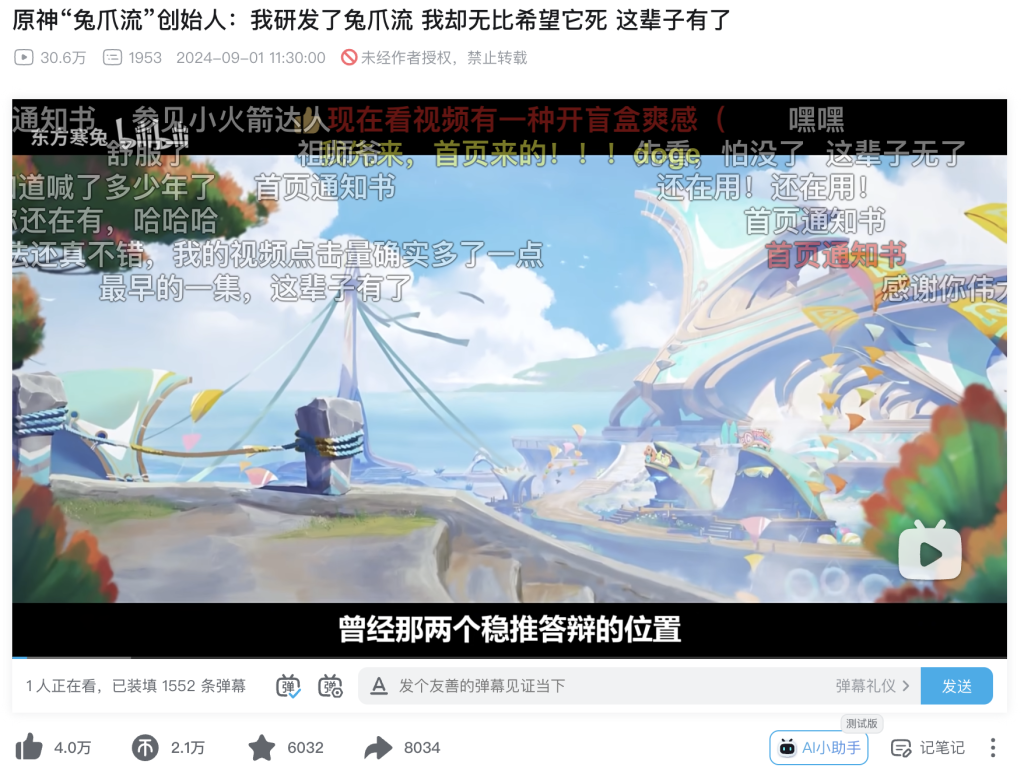
Screenshot from a bilibili video titled“原神‘兔爪流’创始人:我研发了兔爪流 我却无比希望它死 这辈子有了”(I Discover the Rule bilibili for Genshin—And I Hope It won’t work anymore). The video humorously reflects on bilibili’s algorithmic preference for sarcastic or critical Genshin content. Scrolling bullet comments show viewers laughing at how predictable and exploitable the platform’s recommendation system has become.
Note. Screenshot taken from Bilibili, uploaded by user @东方寒兔, https://www.bilibili.com/video/BV1n84y1H7vG
Such attempts actually help them higher viewed and posted on official front page recommendations. So more video creators whose view was constantly being squeezed by the attackers had to occasionally utilize the rules to get better rewards for themselves. Players and creators jokingly refer to this as “occupy the way of the enemy”.
- 4. Players’ internalized self-denial and “preset criticism mechanisms”
In such a prolonged environment of criticism and hatred, Genshin players gradually developed a second-level damage effect on the internet due to hate speech. According to Barendt (2018, p. 541), hate speech“… poses an environmental threat to social peace, a sort of slow-acting poison… producing its effects over years.” The players transform external discrimination into self-disparagement and forced rationality/self-dissolution through constant attacks. For example, when experiencing the new version of the game content, players might subconsciously look for the shortcomings first, or actively lower their expectations.
This kind of behavior is ostensibly critical or rational, but at a deeper level, it is actually a psychological protection: to reduce the cognitive gap and injury by bad reviews and malicious comments on social media. This is a kind of self-protection mechanism in a high-pressure environment: players begin to actively use a negative tone to meet the public’s low expectations of the game, so as to avoid being labeled as “Genshin trash” or “Genshin brainless fans”.
This phenomenon reminds us that the impact of hate speech is not only on the surface of the discourse, but may be embedded in the group’s emotional response patterns and socialization strategies, creating a culture of internalized censorship themselves.
Similarly, players may also begin to use offensive self-deprecation to dispel the discomfort of seeing such speech. For example, in 2020, when Genshin was first released to the public, a bilibili creator, FanShi (with 6 million followers), played Genshin for the first time and gave a favorable recommendation. This led to a whole 100,000 comments being attacked on his comment section in a week, and the video being reported countless times by haters. Nowadays, the new bullet comments and messages from players on that video are jokingly called the video as “Ancient Battlefield”. Such jokes are just a form of self-deprecation after being attacked so many times.
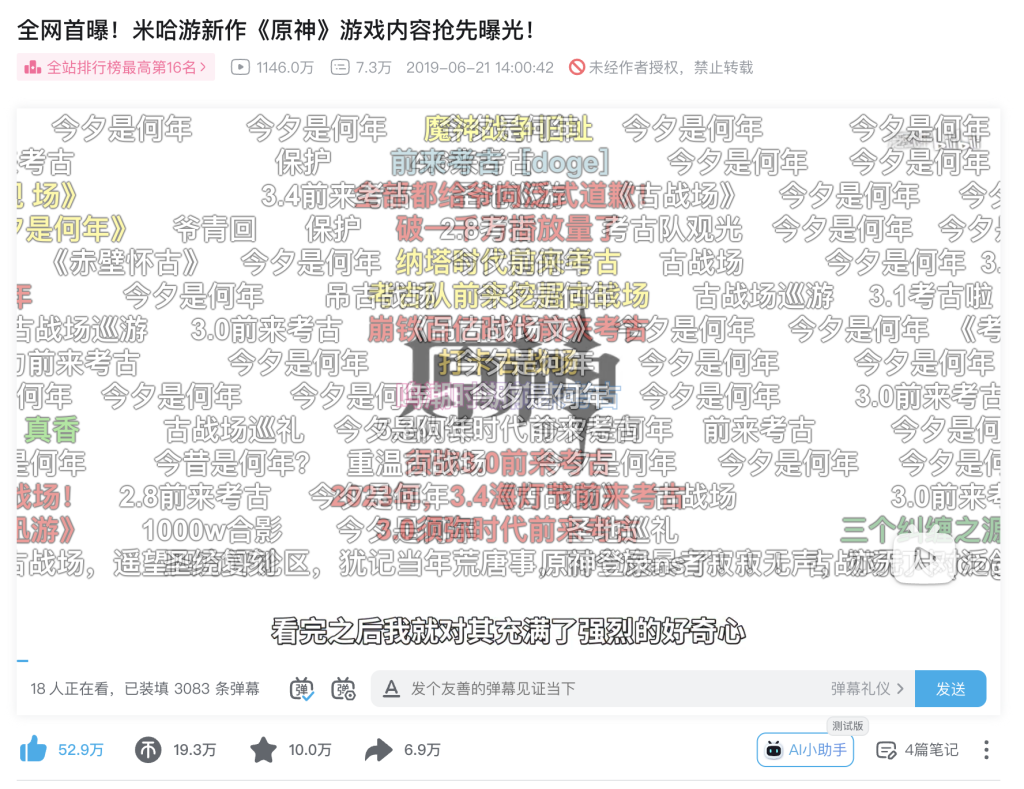
Screenshot from a 2019 bilibili video titled “全网首曝!米哈游新作《原神》游戏内容抢先曝光!” (“World Premiere: First Look at miHoYo’s New Game Genshin Impact”). This video, posted by creator 泛式(FanShi), was one of the first to reveal Genshin’s gameplay. While the creator expressed excitement about the game, the video later attracted over 100,000 negative comments. The bullet comments now full of jokes “ancient battlefield”.
Note. Screenshot taken from Bilibili, uploaded by @泛式, https://www.bilibili.com/video/BV1x4411H7Rd
- 5. Possible measures and summary
As a game itself, the quality of Genshin Impact has been recognized by many platforms and officials. Many overseas game awards have been won by Genshin, and Chinese television stations and game designers have also repeatedly praised Genshin for its successful art production and cultural dissemination. This is probably why players are willing to continue experiencing the game despite the hate speech.
In fact, the whole hate speech is a case of “pride and prejudice” that doesn’t meet the public’s expectations. The public bias against games, especially ACGN games, has led to an inability to accept and recognize their success and the fact that gamers are simply choosing “a fun game”.
Perhaps players should still try to use formal methods to defend their rights. For example, using the platform reporting mechanism, which is still sometimes useful. And platforms should also make efforts to correctly face the problems of their platforms and respect every user’s right to be informed of rational messages. Meanwhile, more people should be made aware of how damaging the systematic discrimination is, so that more followers and the herd know the truth. Let the public realize that there are many situations like Genshin’s hate speech going on, and it is by no means an isolated case. And just how much damage such systematic discrimination can do to the individuals in it, we don’t want it to be verified by the tragedies that have happened or will happen.
Genshin Impact created countless rewards in the history of Chinese games, also worldwide, and remains one of the peak of open-world game interpretation of mobile games. In the face of so much criticism, the players of it are still trying to keep up with the game’s updates and continue to publicize the game’s excellent content and values with their own power.
But in the Chinese online sphere, Genshin’s success — and the players who supported it — has become a kind of crown without applause. Perhaps where success is met with scorn, and harm becomes the norm, it is the blind spot at the depth of this cultural architecture.
Reference
Barendt, E. (2019). What is the harm of hate speech? Ethical Theory and Moral Practice, 22(3), 539–553. https://doi.org/10.2307/45217319
Carlson, B., & Frazer, R. (2021). Indigenous digital life: The practice and politics of being indigenous on social media. Springer Nature.
DongFangHanTu. (2024). I Discover the Rule bilibili for Genshin — And I Hope It won’t work anymore [Video]. In bilibili. https://www.bilibili.com/video/BV1wr421N77B/?spm_id_from=333.337.search-card.all.click&vd_source=ffdf971c7ad747aae7fe8f03a05d7d09
FanShi. (2019). World Premiere: First Look at miHoYo’s New Game Genshin Impact [Video]. In bilibili. https://www.bilibili.com/video/BV13441137qo/?spm_id_from=333.788.recommend_more_video.0&vd_source=ffdf971c7ad747aae7fe8f03a05d7d09
Parekh, B. (2012). Is there a case for banning hate speech? In M. Herz & P. Molnar (Eds.), The Content and Context of Hate Speech: Rethinking Regulation and Responses (pp. 37–56). Cambridge University Press.
Sinpeng, A., Martin, F. R., Gelber, K., & Shields, K. (2021, January 1). Facebook: Regulating hate speech in the Asia Pacific. https://doi.org/10.25910/j09v-sq57
TangYan-MightyYaSuo. (2022). Supporting Content Creators Against Doxxing [Video]. https://www.bilibili.com/video/BV1M8411b7nk/?spm_id_from=333.337.search-card.all.click&vd_source=ffdf971c7ad747aae7fe8f03a05d7d09

Be the first to comment